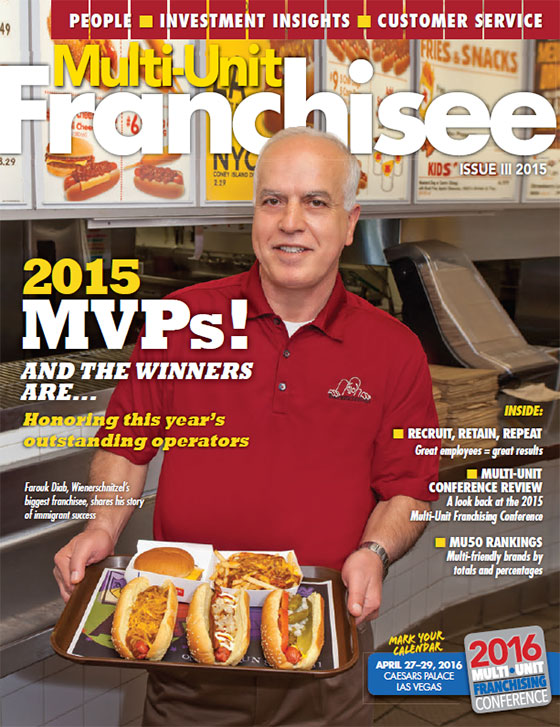Recruit, Retain, Repeat: How to Find, Hire, and Keep the Best Employees

When it comes to hiring, BrightStar Care franchisees Maureen and Peter Moore count on more than just credentials to get the job done. The Moores, BrightStar's 2014 franchisees of the year, estimate that for every 10 applicants, only half make the cut to interview for a position with their in-home care business that serves Norwalk, Bridgeport, and Southbury, Conn.
"Of those five, three get hired, and of those three at least one is gone within two weeks because they don't show the type of attitude in the field that we expect," says Peter Moore. Their company, with nearly 200 employees, practices a rigorous supervision schedule to oversee staffers in the field that exceeds franchise requirements.
Recruiting and retaining high-quality employees has always been a winning business formula, but these days the right hires--so crucial to the bottom line--are harder to find, despite the growth of job-finding websites. A shrinking labor pool is expected to make it increasingly difficult for franchisees in many industries to lure high-value, long-term employees for management positions and fill open jobs with quality workers.
"We have gotten lazy as employers, accustomed to a large candidate pool," says Adam Robinson, co-founder and chief hireologist at Hireology, a Chicago-based hiring platform company. "That has changed. We are back to the war on talent again."
These dramatic labor landscape shifts, along with the uncertainty of potential regulatory threats that could redefine the traditional franchise employer-employee model, come just as the consumer base itself is undergoing a facelift. By 2017, the Millennial generation (those born after 1980) will have more purchasing power than the Baby Boomers, says Robinson, whose company was named to the "2015 Best Places to Work" list by Crain's Chicago Business. "Millennials are going to be the biggest customers in two years," says Robinson. "Why worry about this? You have to have the staff that relates to those consumers."
The good news: franchisees who view recruiting as a mindset and a "permanent, always-on business process" can successfully build a team for growth, says Robinson. He recommends managers devote 30 percent of their time to employment recruitment. "You don't need to be building a Fortune 500 recruiting operation to get this right," he says. "You can do this if you have a process and approach you are committed to. But I'll tell you this, it is really expensive to not do it right."
The laws of attraction
For Maureen and Peter Moore, finding quality employees for their caregiver agency is a personal mission. When Maureen couldn't find suitable care for her father when he was diagnosed with a rare form of cancer, she took on the job herself.
After her father's death in 2009, she set out to help others facing the same frustrating dilemma. Her husband, who had retired from a 42-year career in international banking, joined the quest to find a provider of high-quality in-home care. The pair discovered BrightStar Care and a new career and life for themselves. (Coincidentally, BrightStar was founded by a couple confronting a similar problem: finding quality care for an aging grandparent.)
To the Moores, nothing is more important than finding the right people for the job. "We are dealing with human beings, not with cars or hamburgers," says Maureen, whose background is in banking and consumer relations. "When we put a person out in the field with one of our clients, the care has to be the best I believe the industry has to offer, because of the human factor."
The Moores are always looking to hire and largely turn to their existing staff for recommendations. They estimate 85 percent of their caregiver hires come from word-of-mouth employee referrals. "They want their co-workers to be as good as can be, as good as they are," says Maureen. "The better the job we do, the better the word-of-mouth and the more cases they will be invited to participate in."
Finding the right fit
While technology can make finding potential employees easier than ever, what a franchisee does next can make or break their recruiting efforts. "You have to take the time to research and understand what is out there and make decisions about what is applicable to you," says Robinson. "Your recruiting systems are as important as your marketing systems. Until you get to the point of realizing that, you are always going to be behind the curve."
Franchisees looking to bolster their recruitment efforts should start by evaluating every part of the hiring process, including all job application and career sites they may use. Job descriptions should be clear and candidate questions and predictive testing job-specific. Pre-hire assessments and scripted interview guides can also help a company predict whether or not a potential hire will be successful, says Robinson.
This begins with defining the ideal employee for the specific job and the culture of your business. "You have to go into the hiring process with a clear picture of what you're looking for," says Tropical Smoothie Café area developer and franchisee Michelle Shriver, who, with husband Kriss, operates six locations in Colorado and Nevada.
Shriver, with 18 years of hospitality experience in the casino/hotel industry, always includes her best employees in the interview process as a way to create a strong team culture and buy-in on the potential hire.
"I think the most important aspect of building a great team is accountability," she says. "You need to care enough about the entire team to ensure only the best employees make the cut--both in joining the team and staying part of it. You can't retain employees who bring others down or don't carry their weight on the team. If you do, you'll lose your best employees and end up not having a team at all."
Hireology's Robinson likewise urges franchisees to rethink how they view hiring based on what they need for their business. For instance, the best employees may not always be the most talented--nor should they be, necessarily. "You might want that superstar manager, but the superstar associate looking for a career path that never gets it is going to quit," he says. "Maybe the job doesn't need exceptionally high-quality talent. Maybe you just need folks who are steady, show up on time, and do good work. They aren't superstars, but they will stay."
Building the right team for growth also means keeping your top talent. Massage Envy franchisee Rick Davis says doing a better job up front of selecting the right person for the right position has had the greatest impact on employee retention at his five Seattle-area spas.
Davis, a former technology executive with Apple, Claris, and Kinko's, says the Predictive Index behavioral assessment and pre-employment screening tools also provide valuable insights into who will be the best fit and happiest in the job.
With nearly 200 employees, Davis--CEO of Redmond, Wash.-based Corazon Partners, is a past franchisee of the year recipient and founding chair of Massage Envy's national franchise advisory board--focuses on hiring strong unit managers. The general manager, he says, is the most important job in the company and a key ingredient of his business success. "My advice to multi-unit owners is to make sure you have the best unit managers in every one of your locations. It makes all the difference," he says.
Robinson agrees that retention starts at the top. He estimates that 50 percent of the factors that predict someone's job success is connected to the manager and their working environment. Millennial employees, for instance, are generally career-minded, engaged, and technologically savvy. They don't want a job, he says, they're seeking an experience.
"Good people leave for better opportunities," he says. "If you can't retain them, nothing else matters. You can have the best recruiting funnel in the world, but if your manager can't provide a workplace environment that is somewhere they want to stay, they will leave."
Accentuate the positive
Franchisees who attract and retain great employees also implement strategies and programs that communicate and promote good performance and company loyalty. And while money still talks, it is not the be-all and end-all. Employees are motivated by human factors such as appreciation, recognition, a sense of purpose, and respect. "Money is a dissatisfier, not a satisfier," says Davis. "We try to take money off the table as a reason someone would want to leave."
Keeping employees is tougher in high-turnover industries such as food service and retail. Nevertheless, there are ways to manage and boost retention rates, such as increasing employee satisfaction through proper onboarding, fair shift schedules, team-building, and recognition.
It is important to catch your employees doing things right, says Shriver. Her employee base at Tropical Smoothie is split about evenly between part- and full-time employees, and she documents everything noteworthy for each, especially their accomplishments. Shriver says many employees stick with the franchise for years, including high school hires who stay on through college. "I can't point to one thing that causes that loyalty," she says. "But to start, we truly care about our employees. There is no faking that, and they can tell if you do or don't care."
When working with younger generations--the mainstay of the restaurant industry--it helps to be "young at heart," says Shriver. The couple hosts pool parties, holiday potlucks, employee contests for prizes and gift cards, and invite their employees to join them in their many charitable works, efforts those employees "seem to get really behind," she says. "What I think employees appreciate the most is thanking them when they do a good job," she says. "We have a lot of high fives, fist bumps, and hugs in our cafes!"
Today's employees also expect and benefit from regular, ongoing feedback. At Massage Envy, for instance, Davis offers each employee a monthly "cadence of conversation," a practice that uncovers problems sooner rather than later, and which helps to recognize and encourage strong employee performance and loyalty.
In the end, Davis has found it pays to put people ahead of profits to create a winning team. "When we have to make a decision between what is going to help people and what is going to help our margin, we tend to come down on the side of our people."
Hiring Process Checklist
Technology is making it easier to find employees, but your process may actually slow down recruitment efforts. Consider the following checklist of questions from Hireology co-founder Adam Robinson to determine if your hiring process is up to snuff:
- Does the career site reflect my brand, and will it attract the people I need to attract?
- Do I respond to applicants within 24 hours of resume submittal?
- Is an interview scheduled with a candidate within a week of the applicant's resume submittal?
- Have I established criteria to evaluate the recruit's suitability for the job, or am I just winging it?
Share this Feature
Recommended Reading:
FRANCHISE TOPICS
- Multi-Unit Franchising
- Get Started in Franchising
- Franchise Growth
- Franchise Operations
- Open New Units
- Franchise Leadership
- Franchise Marketing
- Technology
- Franchise Law
- Franchise Awards
- Franchise Rankings
- Franchise Trends
- Franchise Development
- Featured Franchise Stories
FEATURED IN

Multi-Unit Franchisee Magazine: Issue 3, 2015

$500,000





 The multi-unit franchise opportunities listed above are not related to or endorsed by Multi-Unit Franchisee or Franchise Update Media Group. We are not engaged in, supporting, or endorsing any specific franchise, business opportunity, company or individual. No statement in this site is to be construed as a recommendation. We encourage prospective franchise buyers to perform extensive due diligence when considering a franchise opportunity.
The multi-unit franchise opportunities listed above are not related to or endorsed by Multi-Unit Franchisee or Franchise Update Media Group. We are not engaged in, supporting, or endorsing any specific franchise, business opportunity, company or individual. No statement in this site is to be construed as a recommendation. We encourage prospective franchise buyers to perform extensive due diligence when considering a franchise opportunity.